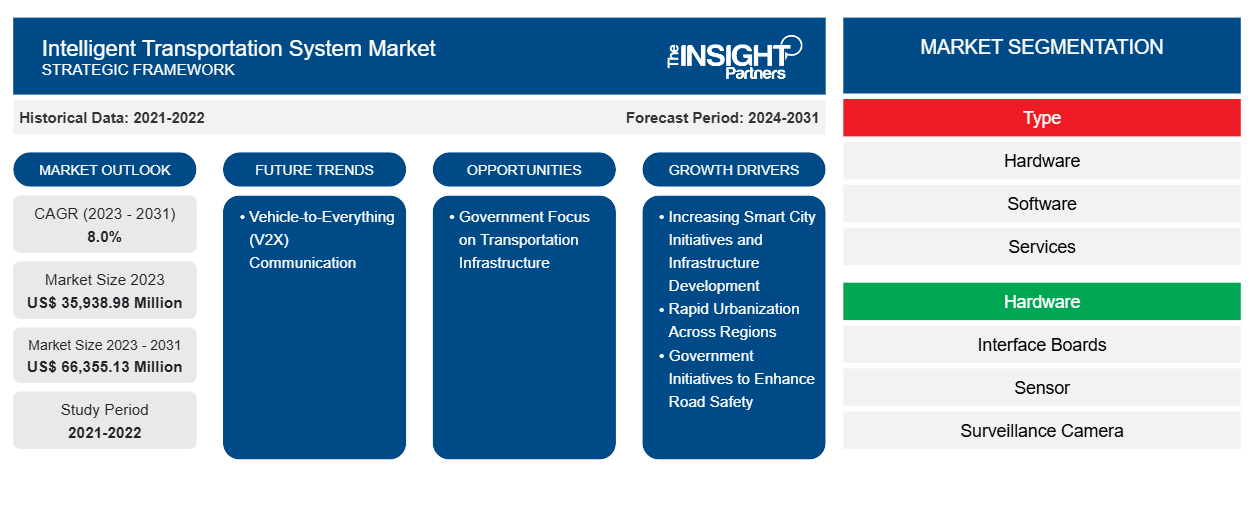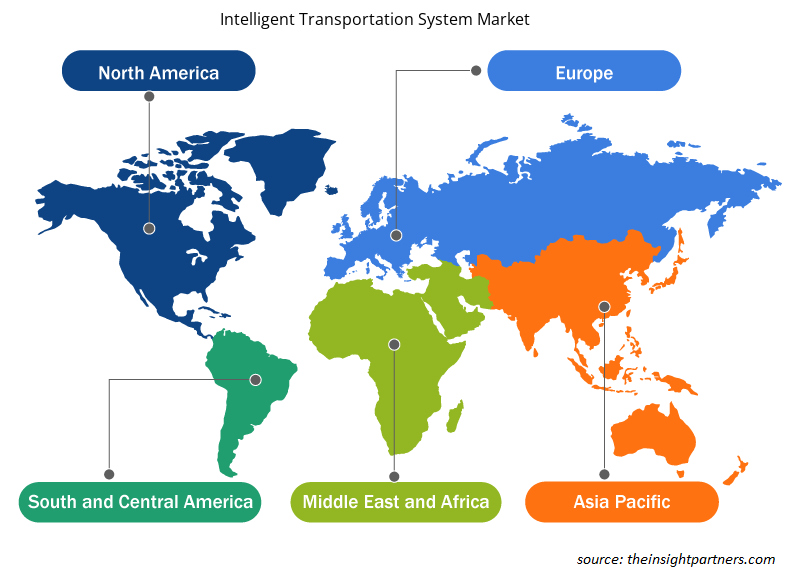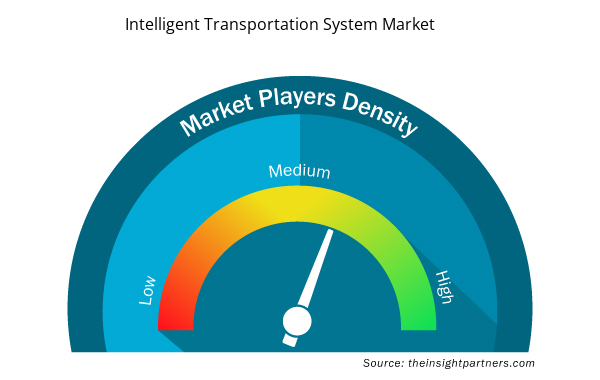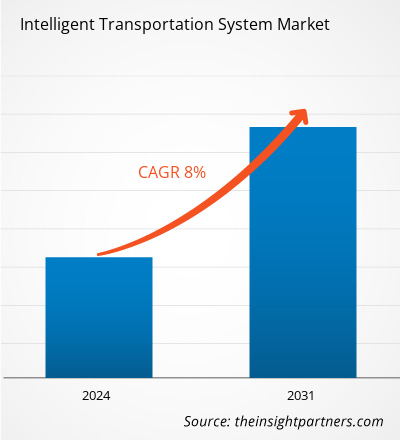The intelligent transportation system market size is projected to reach US$ 66,355.13 million by 2031 from US$ 35,938.98 million in 2023. The market is expected to register a CAGR of 8.0% during 2023–2031. The implementation V2X for intelligent transportation systems is likely to emerge as a new trend during the forecast period.
Intelligent Transportation System Market Analysis
Roads (vital components of urban infrastructure) facilitate human mobility and logistics, serve as the basis of social and economic growth, and link cities, ports, and airports. Although road maintenance and development promote economic growth, the increased traffic volume leads to issues such as overcrowding and road accidents. The negative consequences of increasing vehicle ownership have been worse in recent years. It has led to a significant increase in road traffic injuries and environmental degradation due to greenhouse gas emissions. To improve traffic management and infrastructure, ITS uses a wide range of ICTs based on wired and wireless connections. It lowers transportation risks, eases traffic congestion, increases transportation efficiency, lowers pollution, and enhances the driving experience, road system safety, and capacity. By integrating cutting-edge communications technology into the transportation infrastructure and vehicles, ITS increases productivity, improves mobility and safety in transportation, and strengthens global connection. Thus, the demand for ITS is expected to grow in the upcoming years. The intelligent transportation system (ITS) market is majorly driven by increasing smart city initiatives and infrastructure development, rapid urbanization across regions, and government initiatives to enhance road safety. Further, the focus of government bodies to improve transportation infrastructure is expected to generate lucrative opportunities in the market during the forecast period. However, system integration challenges, cybersecurity threats, and high maintenance costs are factors hampering the market growth.
Intelligent Transportation System Market Overview
Intelligent transportation systems use state-of-the-art wireless, electronic, and automated technologies to monitor, assess, and control transportation networks. They use information and communications technology (ICT) to connect automobiles and transportation infrastructure. Thus, the advantages of wireless devices, sensor technologies, and smart ICT services have led to a surge in the adoption of ITS. Further, ITS has numerous applications in tolling, commercial vehicle operations, traffic operations, traveler information, and public transportation to improve traffic flow, prevent collisions, and enhance passenger comfort and safety.
Customize This Report To Suit Your Requirement
You will get customization on any report - free of charge - including parts of this report, or country-level analysis, Excel Data pack, as well as avail great offers and discounts for start-ups & universities
Intelligent Transportation System Market: Strategic Insights

- Get Top Key Market Trends of this report.This FREE sample will include data analysis, ranging from market trends to estimates and forecasts.
Customize This Report To Suit Your Requirement
You will get customization on any report - free of charge - including parts of this report, or country-level analysis, Excel Data pack, as well as avail great offers and discounts for start-ups & universities
Intelligent Transportation System Market: Strategic Insights

- Get Top Key Market Trends of this report.This FREE sample will include data analysis, ranging from market trends to estimates and forecasts.
Intelligent Transportation System Market Drivers and Opportunities
Rapid Urbanization Across Regions to Fuel Market Growth
Traditional transportation infrastructure is perceived to be inefficient in resource allocation, pollution control, and traffic congestion. The increase in commuter traffic and vehicle ownership generates a persistent need for intelligent solutions and improved traffic management techniques. ITS aids in automated parking, smart traffic lights, and real-time public transport tracking. Transportation management is an important aspect of urban planning and development. According to the United Nations Economic Commission for Europe (UNECE), by 2050, 55% of the world's population is expected to live in urban areas. Further, according to the World Bank, 56% of the world's population, i.e., 4.4 billion inhabitants, currently live in cities. This trend is expected to continue, with the urban population reaching new heights by 2050, wherein nearly 7 of 10 people may live in cities. Given that cities create over 80% of the world's GDP, well-managed urbanization can promote sustainable growth by boosting productivity. Thus, urban expansion and development boost the intelligent transportation system market growth.
Government Focus on Transportation Infrastructure
The construction of metro facilities, new airports, and railway networks is growing worldwide. In March 2023, the Canadian Kelowna City Council approved the funding of US$ 90 million for the Kelowna Airport terminal expansion project. As of 2023, six new airports were under construction in the US. In 2022, the Government of India announced its plans to build 220 airports by the end of 2025. In 2023, the Indian government approved US$ 3.93 billion for seven transformative railway projects to boost connectivity. In November 2021, The US Congress passed the Bipartisan Infrastructure Deal to repair and rebuild roads and bridges across the country by investing US$ 110 billion. By focusing on climate change mitigation, resilience, equity, and safety for all users, the investment is aligned to transform poor roads and highways in the country in the next five years. According to a joint statement by the US President and Canada's Prime Minister in March 2023, under the Canadian Critical Minerals Infrastructure Fund, ~US$ 1.09 billion (CAD 1.5 billion) will be invested to support clean energy and transportation infrastructure projects. Thus, the growing infrastructure development projects across the world are expected to create lucrative opportunities for the ITS market growth during the forecast period.
Intelligent Transportation System Market Report Segmentation Analysis
Key segments that contributed to the derivation of the intelligent transportation system market analysis are type, system, and application.
- Based on type, the intelligent transportation system market is segmented into hardware, software, and services. The hardware segment held the largest market share in 2023. The hardware category is further segmented into interface boards, sensor, surveillance camera, telecommunication network, monitoring and detection system, and others.
- Based on system, the intelligent transportation system market is segmented into advanced traffic management system (ATMS), advanced traveler information system (ATIS), ITS-enabled transportation pricing system (ITPS), advanced public transportation system (ATPS), commercial vehicle operation (CVO), and others. The advanced traffic management system (ATMS) segment held the largest market share in 2023.
- Based on application, the market is divided into fleet management and asset monitoring, intelligent traffic control, smart ticketing, variable traffic message sign, collision avoidance, and others. The intelligent traffic control segment held the largest share of the market in 2023.
Intelligent Transportation System Market Share Analysis by Geography
The geographic scope of the intelligent transportation system market report is mainly divided into five regions: North America, Asia Pacific, Europe, the Middle East & Africa, and South & Central America. Europe is the second-largest contributor to the global intelligent transportation system market, followed by Asia Pacific. Government bodies across this region are focusing on smart mobility and the implementation of ITS. For instance, in October 2023, with a view to accelerating digital transition and smarter mobility in the EU, the Council adopted a new framework for the deployment of ITS by revising the 2010 directive. Technology advancements such as automated and connected mobility, on-demand mobility apps, and multimodal transportation are all intended to be taken into consideration by the updated directive. Additionally, it seeks to improve interoperability and speed up the availability of digital data that supports navigation and multimodal trip planners. This will enable communication between automobiles and road infrastructure to alert drivers to unforeseen circumstances, such as a traffic bottleneck up ahead. On June 2, 2022, the Council adopted a general stance on this proposal. On June 9, 2023, a provisional agreement on the new directive's language was obtained after interinstitutional discussions with the European parliament.
Intelligent Transportation System Market Regional Insights
The regional trends and factors influencing the Intelligent Transportation System Market throughout the forecast period have been thoroughly explained by the analysts at Insight Partners. This section also discusses Intelligent Transportation System Market segments and geography across North America, Europe, Asia Pacific, Middle East and Africa, and South and Central America.

- Get the Regional Specific Data for Intelligent Transportation System Market
Intelligent Transportation System Market Report Scope
| Report Attribute | Details |
|---|---|
| Market size in 2023 | US$ 35,938.98 Million |
| Market Size by 2031 | US$ 66,355.13 Million |
| Global CAGR (2023 - 2031) | 8.0% |
| Historical Data | 2021-2022 |
| Forecast period | 2024-2031 |
| Segments Covered |
By Type
|
| Regions and Countries Covered | North America
|
| Market leaders and key company profiles |
Intelligent Transportation System Market Players Density: Understanding Its Impact on Business Dynamics
The Intelligent Transportation System Market market is growing rapidly, driven by increasing end-user demand due to factors such as evolving consumer preferences, technological advancements, and greater awareness of the product's benefits. As demand rises, businesses are expanding their offerings, innovating to meet consumer needs, and capitalizing on emerging trends, which further fuels market growth.
Market players density refers to the distribution of firms or companies operating within a particular market or industry. It indicates how many competitors (market players) are present in a given market space relative to its size or total market value.
Major Companies operating in the Intelligent Transportation System Market are:
- Hitachi
- Siemens
- DENSO
- Cisco Systems, Inc.
- INDRA SISTEMAS SA
- EFKON GmbH
Disclaimer: The companies listed above are not ranked in any particular order.

- Get the Intelligent Transportation System Market top key players overview
Intelligent Transportation System Market News and Recent Developments
The intelligent transportation system market is evaluated by gathering qualitative and quantitative data post primary and secondary research, which includes important corporate publications, association data, and databases. A few of the developments in the intelligent transportation system market are listed below:
TomTom (TOM2), the location technology specialist, announced that it is deepening and extending its collaboration with Microsoft. TomTom’s maps and traffic data will power location-based services across Microsoft’s solutions, reaching hundreds of millions of people and organizations daily. The companies will work closely together on bringing innovations to market, including AI-infused products. In addition, TomTom is reaffirming Microsoft Azure as its preferred cloud provider. (Source: TomTom, Press Release, July 2024)
Kapsch TrafficCom's Automatic Number Plate Recognition (ANPR) software has received a big update lately. Depending on the application, the update can attain top performance in automatic number plate recognition. With the new ANPR software, artificial intelligence software was trained to detect number plates accurately and reliably using hundreds of thousands of photos in a GDPR-compliant manner. This will aid in the identification of vehicles without generating traffic congestion. (Source: Kapsch TrafficCom, Press Release, April 2023)
Intelligent Transportation System Market Report Coverage and Deliverables
The "Intelligent Transportation System Market Size and Forecast (2021–2031)" report provides a detailed analysis of the market covering below areas:
- Intelligent transportation system market size and forecast at global, regional, and country levels for all the key market segments covered under the scope
- Intelligent transportation system market trends, as well as market dynamics such as drivers, restraints, and key opportunities
- Detailed PEST and SWOT analysis
- Intelligent transportation system market analysis covering key market trends, global and regional framework, major players, regulations, and recent market developments
- Industry landscape and competition analysis covering market concentration, heat map analysis, prominent players, and recent developments for the intelligent transportation system market
- Detailed company profiles
- Historical Analysis (2 Years), Base Year, Forecast (7 Years) with CAGR
- PEST and SWOT Analysis
- Market Size Value / Volume - Global, Regional, Country
- Industry and Competitive Landscape
- Excel Dataset



Report Coverage
Revenue forecast, Company Analysis, Industry landscape, Growth factors, and Trends

Segment Covered
This text is related
to segments covered.

Regional Scope
North America, Europe, Asia Pacific, Middle East & Africa, South & Central America

Country Scope
This text is related
to country scope.
Frequently Asked Questions
Asia Pacific is anticipated to grow at the fastest CAGR over the forecast period.
The key players operating in the intelligent transportation system market include Hitachi; Siemens; DENSO; Cisco Systems, Inc.; INDRA SISTEMAS; SA; EFKON GmbH; Cubic Transportation Systems, Inc.; Kapsch TrafficCom AG; TomTom International BV.; and Teledyne FLIR LLC.
Modern wireless networks connect cars, pedestrians, infrastructure, highways, etc., using cutting-edge communication technology. In the framework of intelligent transportation systems, vehicle-to-everything (V2X) communication supports a wide range of use cases, including entertainment services, cooperative autonomous driving (traffic information exchange), and traffic safety (traffic jam/accident reporting, collision warning, and collision avoidance).
The intelligent transportation system market was estimated to be valued at US$ 35,938.98 million in 2023 and is anticipated to grow at a CAGR of 8.0% over the forecast period.
Traditional transportation infrastructure is perceived to be inefficient in resource allocation, pollution control, and traffic congestion. The increase in commuter traffic and vehicle ownership generates a persistent need for intelligent solutions and improved traffic management techniques. ITS aids in automated parking, smart traffic lights, and real-time public transport tracking. Transportation management is an important aspect of urban planning and development. According to the United Nations Economic Commission for Europe (UNECE), by 2050, 55% of the world's population is expected to live in urban areas.
The hardware segment led the intelligent transportation system market with a significant share in 2023.
The intelligent transportation system market is expected to reach US$ 66,355.13 million by 2031.
Trends and growth analysis reports related to Technology, Media and Telecommunications : READ MORE..
The List of Companies - Intelligent Transportation System Market
- Hitachi
- Siemens
- DENSO
- Cisco Systems, Inc.
- INDRA SISTEMAS SA
- EFKON GmbH
- Cubic Transportation Systems, Inc.
- Kapsch TrafficCom AG
- TomTom International BV
- Teledyne FLIR LLC

 Get Free Sample For
Get Free Sample For